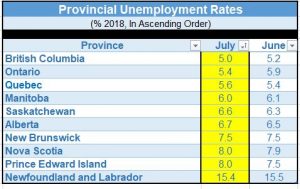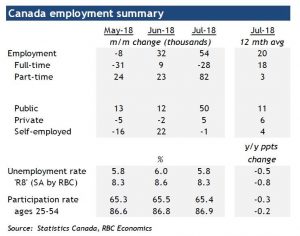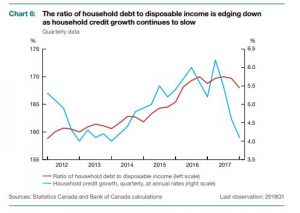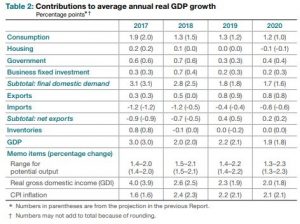As expected, the Bank of Canada held its key overnight rate this morning at 1.5%, asserting that July’s surprising spike in CPI inflation to 3% was in large part because of a jump in airfares. The Bank expects inflation to move back towards 2% in early 2019, as the effects of past increases in gasoline prices dissipate. The Bank’s core measures of inflation remain firmly around 2%, consistent with an economy that has been bumping up against full capacity for some time. Wage growth, as well, remains moderate.
Incoming information on the global economy is consistent with the Bank’s forecast in the July Monetary Policy Report (MPR). The U.S. economy has been particularly strong, growing at a 4.2% rate in the second quarter. This compares to Canada’s growth rate of 2.9% last quarter, which follows a 1.4% pace of economic expansion in Q1. Second quarter growth in the U.S. was boosted by strong consumer spending and business investment. In Canada, third quarter growth is expected to slow temporarily, mainly because of fluctuations in energy production and exports.
Indeed, this morning, Statistics Canada reported that Canada’s trade deficit all but disappeared. A sharp export gain to the U.S. combined with a decline in imports took Canada’s overall merchandise trade deficit to its lowest level since December 2016.
Canada’s merchandise trade surplus with the U.S., targeted by President Donald Trump in NAFTA negotiations, grew to the widest in a decade. Stats Canada said that gains in global exports were led by automobiles and energy, almost all of which were bound for the U.S. Crude oil led the energy gains as prices rose 9.4% in July. The import decline was driven by aircraft and metal ores.
These figures are likely to impact the resumption of bilateral talks in Washington regarding NAFTA, as the Trump administration has negotiated a new deal with Mexico and has threatened to leave Canada out and impose stiff auto tariffs if Prime Minister Justin Trudeau’s government does not make concessions, especially on dairy supply management and dispute mechanisms.
The Bank of Canada highlighted that “elevated trade tensions remain a key risk to the global outlook and are pulling some commodity prices lower…The Bank is also monitoring the course of NAFTA negotiations and other trade policy development closely, and their impact on the inflation outlook.”
It was wise of the Bank of Canada to hold its powder dry at today’s policy meeting given the continued uncertainty on the NAFTA front. An agreement on NAFTA would provide the central bank with more comfort in moving ahead with a hiking cycle that has already lifted the benchmark overnight rate four times since mid-2017.
Noting that “activity in the housing market is beginning to stabilize as households adjust to higher interest rates and changes in housing policies”, the Bank reaffirmed that the economy is doing well enough to require higher interest rates in the future to achieve the inflation target. Another rate hike could come as soon as the next policy meeting on October 24th.
It is widely expected that a NAFTA deal will have come to fruition by then, opening the way for the Bank to resume monetary tightening. According to Bloomberg News, “Investors see near-certain odds that by October, the Bank of Canada will raise borrowing costs for the fifth time since the hiking cycle began in July 2017, with as many as two additional increases by mid-2019.”
– Dr. Sherry Cooper
The Angela Calla Mortgage Team gives you clarity on the best mortgage by being transparent, unbiased free mortgage advice with choice. We are here to help you personally with your mortgage at 604-802-3983 or callateam@dominionlending.ca









